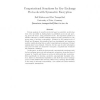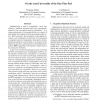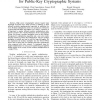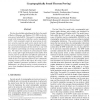773 search results - page 12 / 155 » On Cryptographic Assumptions and Challenges |
CCS
2009
ACM
14 years 4 months ago
2009
ACM
Formal analysis of security protocols based on symbolic models has been very successful in finding flaws in published protocols and proving protocols secure, using automated too...
FOCS
2002
IEEE
14 years 2 months ago
2002
IEEE
Randomization is vital in cryptography: secret keys should be randomly generated and most cryptographic primitives (e.g., encryption) must be probabilistic. As a bstraction, it is...
ICCD
2006
IEEE
14 years 6 months ago
2006
IEEE
— High secure cryptographic systems require large bit-length encryption keys which presents a challenge to their efficient hardware implementation especially in embedded devices...
CSFW
2006
IEEE
14 years 3 months ago
2006
IEEE
We describe a faithful embedding of the Dolev-Yao model of Backes, Pfitzmann, and Waidner (CCS 2003) in the theorem prover Isabelle/HOL. This model is cryptographically sound in ...
EUROCRYPT
2010
Springer
14 years 2 months ago
2010
Springer
We initiate a provable-security treatment of cryptographic agility. A primitive (for example PRFs, authenticated encryption schemes or digital signatures) is agile when multiple, ...




